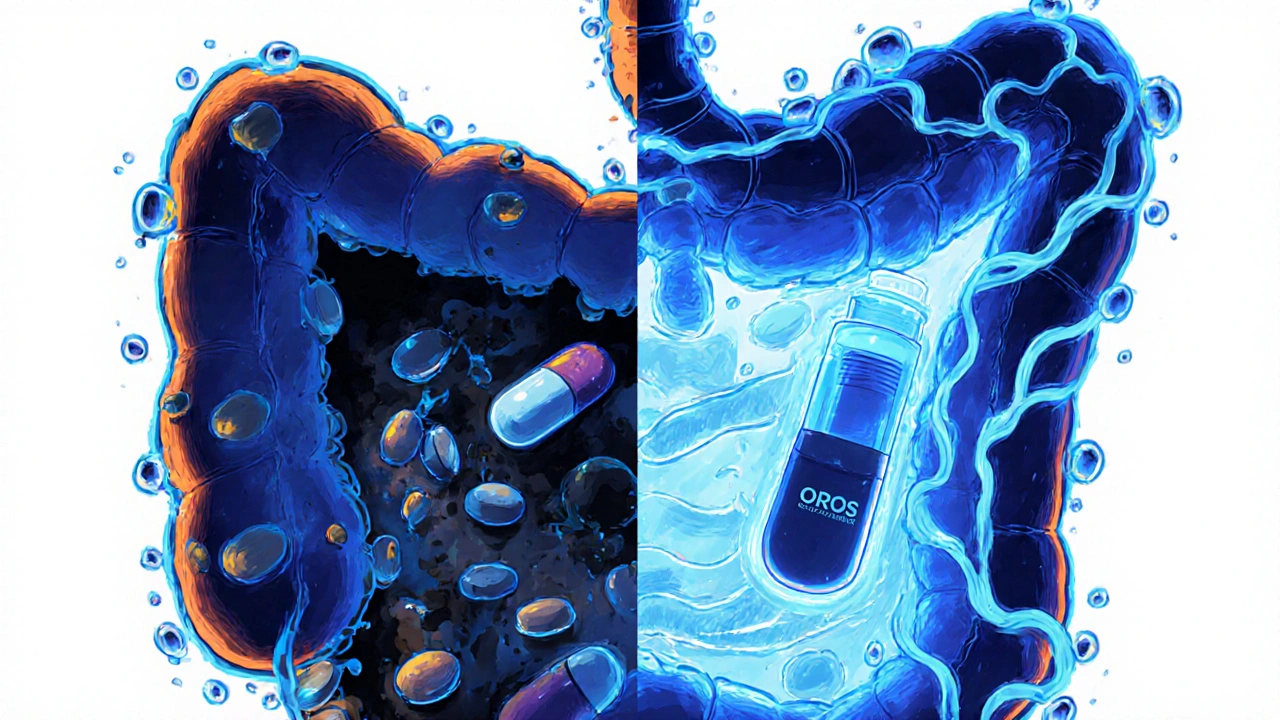Breakfast Timing and Extended-Release Medications: Why Consistency Matters
 Oct, 28 2025
Oct, 28 2025
Medication Timing Guide
Select Your Medication
How to Use This Tool
For best results: Pick your medication from the dropdown above, then follow the timing recommendations to maximize effectiveness and minimize side effects.
For millions of people taking extended-release medications-especially for ADHD, thyroid conditions, or high blood pressure-what you eat in the morning can make a real difference in how well your medicine works. It’s not just about taking your pill. It’s about when you take it in relation to breakfast. Skipping meals, eating late, or switching between fasting and eating a big meal can cause your medication to work inconsistently. And that inconsistency can mean poor focus, mood swings, or even dangerous side effects.
Why Your Morning Meal Changes How Your Medicine Works
Not all extended-release pills are made the same. Some are designed to release their medicine slowly over hours, no matter what’s in your stomach. Others? They’re sensitive. Really sensitive. Take ADDERALL XR, for example. It’s made of tiny beads that release amphetamine over time. But if you eat a fatty breakfast right before taking it, those beads don’t dissolve the way they should. A 2002 study found that when people took ADDERALL XR after a high-fat breakfast, the amount of drug in their blood during the first 8 hours dropped by 30-40%. That’s not a small glitch. That’s the difference between staying focused in class and crashing by 10 a.m. On the other hand, CONCERTA-another popular ADHD medication-uses a different system called OROS. It’s like a tiny pump inside the pill that pushes the medicine out steadily, regardless of food. Studies show it barely budges whether you take it on an empty stomach or with eggs and toast. That’s why so many people switch from ADDERALL XR to CONCERTA. They’re not chasing a brand. They’re chasing consistency.The Science Behind Food and Drug Absorption
Your stomach doesn’t just sit there waiting for your pill. When you eat, especially a meal high in fat, your body slows down digestion. Gastric emptying can take 2-5 hours. That delays when the drug reaches the part of your gut where it’s absorbed. Food also changes stomach acidity and bile flow-both of which affect how well a drug dissolves. The FDA requires drug makers to test new extended-release medications with a high-fat breakfast of 800-1,000 calories-about the size of a bacon, egg, and cheese sandwich with hash browns. That’s not arbitrary. It’s the kind of meal many people actually eat. If a drug’s absorption drops by more than 20% under those conditions, the label has to say so. That’s why levothyroxine (for thyroid) says to take it on an empty stomach-food can cut absorption by up to half. And why GLP-1 drugs like semaglutide need to be taken at least 30 minutes before your first bite. But for some meds, like atorvastatin (a cholesterol pill), timing barely matters. Why? Because they stick around in your system longer. It’s not one-size-fits-all.ADHD Medications: The Real-World Impact
Think about a child with ADHD. They’re supposed to take their medication before school. But if they’re rushed, they might skip breakfast. Or if they’re picky eaters, they might only eat a banana. Then on weekends, they eat pancakes and bacon. Suddenly, their focus changes. Teachers notice it. Parents wonder if the medicine is losing its power. It’s not. It’s the food. Reddit threads are full of stories like this. One user wrote: “I thought I was going crazy-my focus was perfect on weekends when I didn’t eat until noon, but I’d zone out by 10 a.m. on school days.” Another said: “I switched to CONCERTA because I couldn’t deal with the rollercoaster.” Data backs this up. On Drugs.com, 62% of CONCERTA users report consistent effects all day. Only 48% of ADDERALL XR users say the same. That’s a huge gap. And it’s not because one drug is “better.” It’s because one is more predictable with food.
What About Other Medications?
ADHD meds aren’t the only ones affected. Levothyroxine is the classic example. Take it with coffee, milk, or cereal, and you might not get enough hormone. That can lead to fatigue, weight gain, or worse. The fix? Take it first thing in the morning, 30-60 minutes before anything else. For blood pressure meds, timing relative to food matters less. A major 2022 trial with over 21,000 people found no difference in heart outcomes between morning and evening dosing. So if you find it easier to take your pill after breakfast, that’s fine. But statins? Timing matters here too-just differently. Simvastatin and pravastatin work better when taken at night, because your liver makes most cholesterol while you sleep. Atorvastatin and rosuvastatin? They last long enough that morning or night doesn’t matter.How to Build a Reliable Routine
The goal isn’t perfection. It’s predictability. Your body learns patterns. If you take your pill with breakfast every day, it knows what to expect. If you switch between fasting and eating, your blood levels bounce around. That’s what causes symptoms to flare or fade unpredictably. Here’s what works:- If you’re on ADDERALL XR: Take it either 30 minutes before breakfast or 2 hours after. Pick one. Stick to it. No exceptions.
- If you’re on CONCERTA: You can take it with or without food. But if you start taking it with breakfast, keep doing it. Don’t switch back and forth.
- If you’re on levothyroxine: Take it first thing in the morning, wait 30-60 minutes, then eat or drink anything else.
- If you’re on semaglutide: Take it before your first meal of the day. No snacks, no coffee, no exceptions.
What If You Can’t Take It on an Empty Stomach?
Some people get nauseous. Others just can’t stomach pills before school or work. That’s okay. You don’t have to suffer. For stimulants like ADDERALL XR, try a small, low-fat snack-like a banana, a handful of crackers, or a protein bar (under 200 calories)-instead of a full breakfast. That’s often enough to ease nausea without messing up absorption. Or switch to a food-insensitive option like CONCERTA. It’s not about giving up your favorite med. It’s about finding one that fits your life.
What Doctors Should Tell You
Too many patients are left guessing. A 2020 study showed that when doctors spend just 15-20 minutes explaining timing rules at the start of treatment, adherence improves by 37%. That’s huge. Ask your doctor:- Is my medication affected by food?
- Should I take it before or after breakfast?
- Is there a more consistent option if I struggle with timing?
Bart Capoen
October 29, 2025 AT 08:46so i took my adderall xr with a bagel and cream cheese yesterday and crashed hard by 11am. turned out the fat killed the absorption. switched to concerta last week and now i’m actually functional. no more guessing games.
Jen Taylor
October 30, 2025 AT 08:30thank you for this. as someone who’s been on levothyroxine for 12 years, i used to take it with my morning coffee-until my endo finally said, ‘you’re basically taking a placebo.’ now i take it at 5am, wait an hour, then drink my coffee like a civilized human. life-changing. also, protein bars before adderall? genius. i’ve been doing that for months and no more nausea.
Linda Patterson
October 31, 2025 AT 13:32why are we still talking about this like it’s a revelation? the FDA has had guidelines on food-drug interactions since the 90s. if you’re too lazy to read the label, that’s not a systemic failure-it’s personal negligence. people who skip breakfast and then blame their meds are the same ones who blame the weather for their bad mood. take the pill when the damn label says to. end of story.
Patrick Dwyer
November 2, 2025 AT 03:52the pharmacokinetic variability between ADDERALL XR and CONCERTA is well-documented in the OROS vs. bead-release systems. the former’s pH-dependent dissolution profile is highly susceptible to gastric emptying delays induced by lipid-rich meals-hence the 30-40% Cmax reduction observed in fed-state studies. concerta’s osmotic pump mechanism bypasses this entirely, making it the superior choice for non-adherent or irregular-eating populations. this isn’t anecdotal-it’s biopharmaceutics.
Christy Tomerlin
November 3, 2025 AT 00:05you’re all missing the point. the real problem is that big pharma designs drugs to be finicky so you keep buying new ones. switch to concerta? sure. but they just made it more expensive. if you’re rich enough to afford consistency, congrats. the rest of us just suffer and hope.
Kevin Stone
November 4, 2025 AT 16:29interesting. i’ve been taking my atorvastatin with breakfast for years. never knew it didn’t matter. guess i’ve been doing it right by accident. still, i’d rather not risk it. i’ll keep the routine. better safe than sorry.
Shilah Lala
November 5, 2025 AT 17:44so let me get this straight… you’re telling me my 3-hour breakfast of pancakes, bacon, and maple syrup is why i zone out at 10am? and you want me to eat a banana instead? cool. i’ll just stop taking the meds. my brain’s better off anyway.
Gary Fitsimmons
November 7, 2025 AT 05:46my son has adhd and we used to fight every morning about taking his pill. now we do it right after he brushes his teeth, before anything else. no food, no fuss. he’s been doing better in school and i’m not crying every night anymore. small changes, big results.
Natalie Eippert
November 7, 2025 AT 11:50the notion that consistency improves therapeutic outcomes is not unique to pharmacology. it is a foundational principle of behavioral medicine. the human body operates on circadian and homeostatic rhythms. disrupting these through erratic medication timing is tantamount to ignoring the biological architecture of health. this is not opinion-it is physiology.
Emil Tompkins
November 7, 2025 AT 12:46you know what’s really happening? the government and pharma want you to take your pills at breakfast so they can track you better. that’s why they make you wait 30 minutes before coffee. they’re monitoring your glucose spikes. next thing you know, your insurance will raise your rates if your breakfast isn’t FDA-approved. i’m not taking anything until i get my freedom back.
kendall miles
November 9, 2025 AT 09:21what if the real issue is that your body’s absorbing the meds too well? what if they’re designed to make you dependent? i’ve been taking levothyroxine for 7 years. i’ve never felt better. i don’t need a pill to tell me when to eat. my body knows. maybe the system is broken-not me.